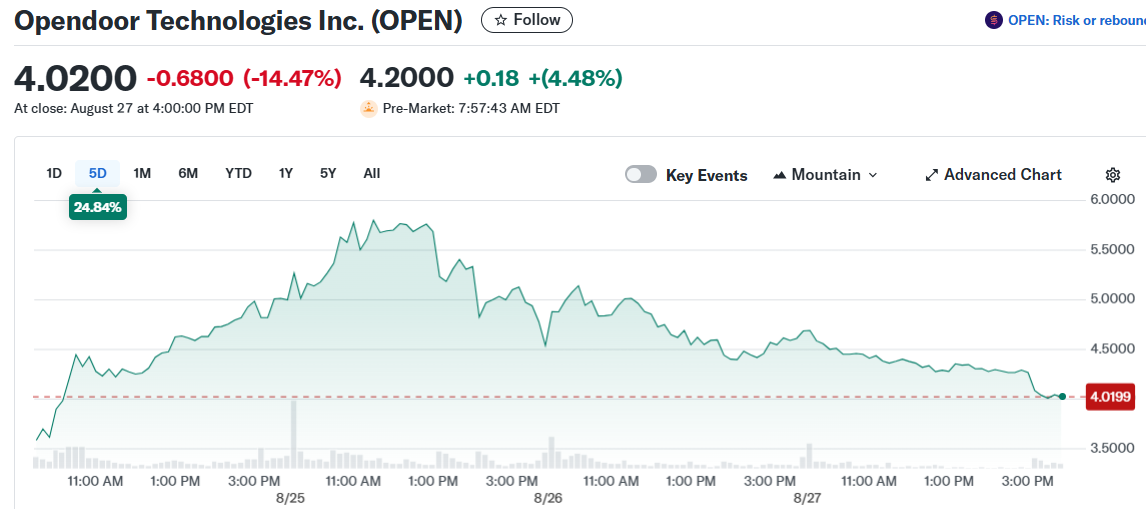TLDR
- Opendoor Technologies (NASDAQ: OPEN) stock dropped 14.7% on Wednesday with no specific business catalyst
- CEO Carrie Wheeler resigned, with Shrisha Radhakrishna taking over as interim leader
- Company postponed shareholder meeting to consider reverse stock split for Nasdaq compliance
- Q3 revenue guidance of $800M-$875M fell short of analyst expectations of $1.06B
- Multiple analysts downgraded the stock to sell with $1 price targets
Opendoor Technologies saw its stock price crater 14.7% on Wednesday as investors grappled with leadership uncertainty and disappointing financial guidance. The real estate technology company’s shares had actually gained as much as 5.7% earlier in the session before reversing course dramatically.

The sell-off came without any specific business catalyst. Instead, it appears to reflect the extreme volatility that has characterized OPEN stock in recent months.
Despite Wednesday’s decline, Opendoor shares remain up roughly 152% year-to-date. The stock had benefited from vocal support by EMJ Capital’s Eric Jackson and meme stock trading activity.
CEO Carrie Wheeler’s recent resignation added to investor concerns about the company’s direction. Shrisha Radhakrishna stepped in as interim CEO to navigate the transition period.
The leadership change comes at a challenging time for Opendoor. The company postponed a shareholder meeting that was set to consider a reverse stock split.
This potential reverse split aims to help Opendoor maintain compliance with Nasdaq listing requirements. The stock has been trading close to the critical $1 threshold.
Revenue Guidance Disappoints
Opendoor’s Q3 revenue projections fell well below Wall Street expectations. The company guided for revenue between $800 million and $875 million for the third quarter.
Analysts had been expecting revenue of approximately $1.06 billion. This represents a substantial miss that spooked investors.
The disappointing guidance reflects ongoing challenges in the real estate market. Higher interest rates have dampened home buying activity across the industry.
Opendoor’s business model of buying homes directly from sellers has faced headwinds. The company then renovates and resells these properties through its platform.
Recent quarterly results showed mixed performance. The company reported a narrower loss of 4 cents per share compared to 13 cents in the prior year period.
Revenue came in at $1.57 billion, slightly above previous quarters. However, the forward-looking guidance overshadowed these modest improvements.
Analyst Downgrades Pile Up
Wall Street analysts have grown increasingly pessimistic about Opendoor’s prospects. Citi downgraded the stock to a sell rating with a price target around $1.
Keefe Bruyette also issued an underperform rating on the shares. These downgrades reflect growing skepticism about the company’s growth trajectory.
The analyst actions came after the disappointing Q3 guidance. Many firms cited concerns about Opendoor’s ability to navigate current market conditions.
The company’s financial metrics reveal the challenges it faces. Opendoor carries a debt-to-equity ratio above 3.46, indicating high leverage.
Both EBIT and EBITDA margins remain negative, showing the company has yet to achieve core profitability. Gross margins hover just above 8%, leaving little room for error.
The current ratio of 4.4 suggests adequate liquidity for near-term operations. Cash flow from operations reached $823 million, providing some financial cushion.
Opendoor has been using cash to reduce debt obligations. This conservative approach aims to strengthen the balance sheet during uncertain times.
The company continues making capital expenditures and property investments. Management appears focused on maintaining operational capacity while managing financial risks.
Recent market volatility has made OPEN a target for speculative trading. Retail investor interest has contributed to wild price swings in both directions.
The stock’s proximity to the $1 level creates additional pressure. Falling below this threshold could trigger further selling from institutional investors.
Opendoor now carries a market capitalization of approximately $3 billion. The company trades at roughly 73% of expected annual sales.
Despite current challenges, the stock remains down about 89% from its all-time highs. This decline reflects the broader struggles facing technology companies in the real estate sector.






